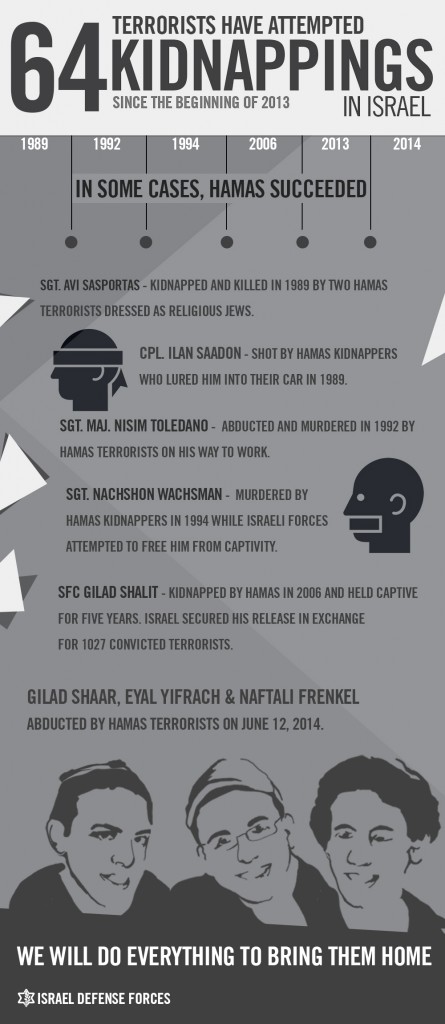8 Years after Shalit, Hamas Remains Committed to Terrorism
Hamas’ recent kidnapping of Israeli teens came nearly eight years after its abduction of SFC Gilad Shalit. Eight years and dozens of attacks later, the organization still hasn’t changed its ways.

![]()
Almost two weeks ago, Hamas kidnapped three teenage boys on their way home from school in Judea and Samaria. The terrorist organization executed a similar attack in June 2006 – eight years ago today – when they infiltrated Israel and abducted SFC Gilad Shalit near Gaza. Together, the kidnappings highlight a clear pattern: Hamas remains committed to its mission of terror.
8 years later… Hamas still threatens to Kidnap Israelis
The recent kidnapping of Eyal Yifrach, Gilad Shaar and Naftali Fraenkel is the just latest in a long series of Hamas abductions. Since the beginning of 2013, Israel has foiled 64 planned abductions, many of them at the hands of Hamas terrorists. After SFC Shalit’s kidnapping on the Gaza border, the organization held him captive until 2011, when Israel exchanged 1,027 convicted terrorists for his release. The attack emphasized the purpose of Hamas abductions: to use Israelis as bargaining chips for the release of convicted Palestinian terrorists.
8 years later…Hamas uses the same rhetoric
In 2006, Hamas leaders and supporters boasted about the abduction of SFC Gilad Shalit. Not long after the soldier’s release, Hamas Prime Minister lauded “the brave resistance, which has kidnapped and held [Israelis] captive.” Leaders of the terrorist organization also welcomed the recent kidnapping of three young Israelis. During an interview on Monday, Hamas political chief Khaled Meshal said “I cannot confirm or deny the abduction,” but “blessed are the hands” that carried it out.
8 years later…Palestinians praise abductions in public
Soon after the recent kidnapping, terrorist organizations praised the attack and urged Palestinians in Judea and Samaria to interfere with Israel’s efforts to locate the boys. Upon hearing of the abduction, Palestinians handed out candy in the streets and posted messages lauding the incident on social media sites. Dozens changed their Facebook profiles, posting pictures of three fingers meant to represent the abducted teens. Activists intentionally linked SFC Shalit to this campaign, calling for additional kidnappings in order to ensure the release of more terrorists.


1 Shalit=1027 prisoners, 3 Shalits= 3081 prisoners
8 years later…Hamas still violates the Geneva Convention
The Geneva Convention guarantees captives and prisoners of war the right to meet with humanitarian organizations. For five years, Hamas terrorists denied Shalit access to these groups, preventing the Red Cross and other organizations from visiting him. Since the abduction, the international community has received no information about the boys from Hamas.
8 years later …Hamas Terrorists still fire rockets from Gaza
Since January 2014, Gaza terrorists have fired nearly 230 rockets into Israel. During the past eight years alone, operatives from Hamas and other organizations have launched more than 10,000 rockets at Israeli civilians. Over 3.5 million Israelis are currently living under threat of rocket attacks. Terrorists have dramatically increased their attacks since the June 12 kidnapping, firing rockets into Israel almost daily. Hamas, the ruling entity of the Gaza Strip, is responsible for most of the rocket fire on Israeli population centers.
Since the end of Operation Pillar of Defense, in November 2012, Hamas has been busy rebuilding its arsenal. Today Hamas is producing its own rockets, namely the M-75, which can reach as far as Tel Aviv and Jerusalem.
But 8 years later…The IDF remains determined to protect Israel
Since the recent kidnapping, IDF forces have searched relentlessly for the teens, checking every house and building in Judea and Samaria. After twelve challenging days, Israeli soldiers remain focused on their objective: to find the kidnapped boys, combat Hamas’ terrorism, and defend Israelis from any attack.



